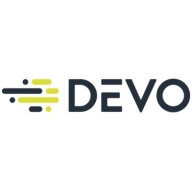

Splunk AppDynamics and Devo compete in the application performance monitoring and data analytics category. Splunk AppDynamics seems to have the upper hand due to its strong capabilities in providing actionable insights and detailed flow maps.
Features:Splunk AppDynamics offers robust application performance monitoring capabilities like real-time alerts, detailed flow maps, and visual metrics for application troubleshooting. It provides end-to-end tracking of application performance, assisting developers in locating performance bottlenecks. Devo excels in handling extensive data analytics with simplified query functions and strong multi-tenant capabilities. It's efficient in processing large datasets across various tenants. Its high-speed analytics and comprehensive data integration are key for security operations.
Room for Improvement:Splunk AppDynamics needs to improve its user interface, simplify alert configuration, and enhance network monitoring integration. Streamlining its licensing model would also be beneficial. Devo, meanwhile, should work on enhancing native parser flexibility and better cloud integration capabilities. Refining its pricing strategy, especially concerning metadata charges, could help manage overall costs.
Ease of Deployment and Customer Service:Splunk AppDynamics offers deployment in On-premises, Public Cloud, and Hybrid Cloud environments, catering to different organizational needs. Its customer service is noted for responsive technical support and dedicated account managers. Devo provides Public Cloud and On-premises deployments and is praised for clear customer support and straightforward technical assistance. Both companies offer excellent support that addresses customer queries promptly.
Pricing and ROI:Splunk AppDynamics is viewed as a premium solution with a higher price point, reflecting its advanced features. The investment is justified by its notable reduction in incident response times and enhanced troubleshooting efficiency, providing clear ROI for large enterprises. Devo’s pricing model is based on data ingestion volume and is simpler, offering competitive costs with numerous features included by default. This supports a favorable ROI by lowering resource needs for data management.


Devo is the only cloud-native logging and security analytics platform that releases the full potential of all your data to empower bold, confident action when it matters most. Only the Devo platform delivers the powerful combination of real-time visibility, high-performance analytics, scalability, multitenancy, and low TCO crucial for monitoring and securing business operations as enterprises accelerate their shift to the cloud.
Splunk AppDynamics enhances application performance monitoring with advanced diagnostics and real-time insights, offering seamless end-to-end transaction tracking and infrastructure visibility.
AppDynamics provides critical tools for businesses to analyze application behavior and performance. Through innovative features like transaction snapshot analysis and adaptable dashboards, users can quickly identify and address issues, ensuring high levels of system uptime and efficiency. It is designed to support complex environments including Kubernetes and AWS, enhancing user experience by detecting performance issues early. Despite needing improvements in network monitoring and integration, it remains a robust option for tracking application health.
What are the key features of AppDynamics?In industries like financial services and e-commerce, AppDynamics facilitates performance tracking across distributed systems, optimizing infrastructure to meet consumer demands. It excels in environments needing precise transaction monitoring and is pivotal in delivering high value and satisfaction.
We monitor all IT Operations Analytics reviews to prevent fraudulent reviews and keep review quality high. We do not post reviews by company employees or direct competitors. We validate each review for authenticity via cross-reference with LinkedIn, and personal follow-up with the reviewer when necessary.